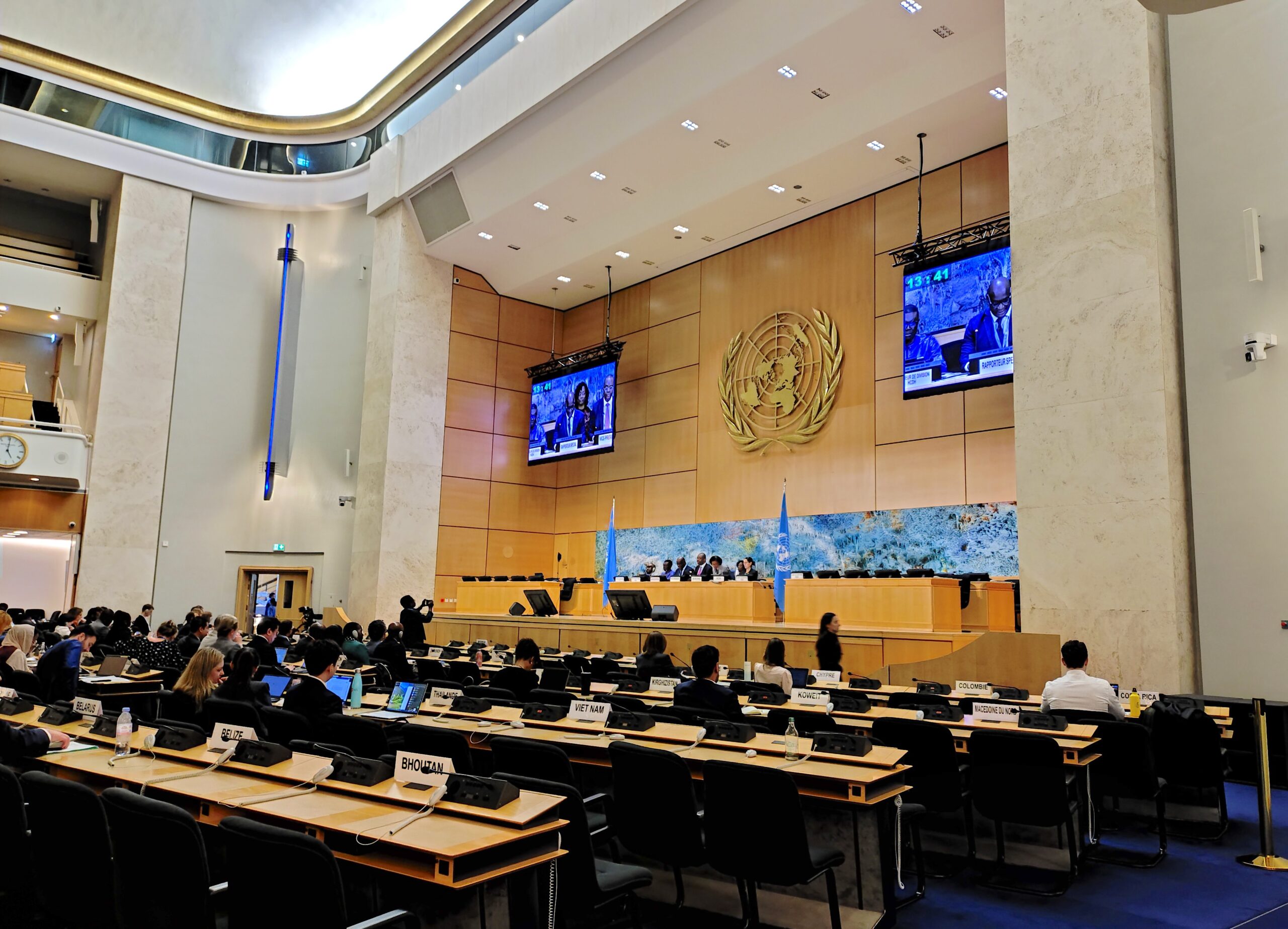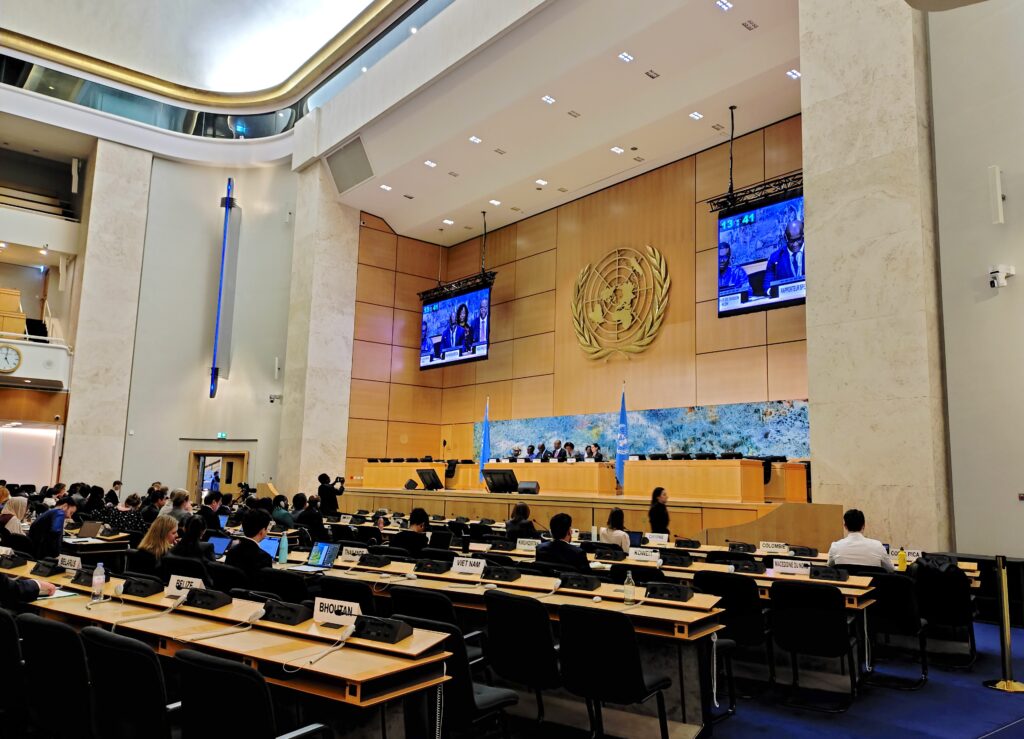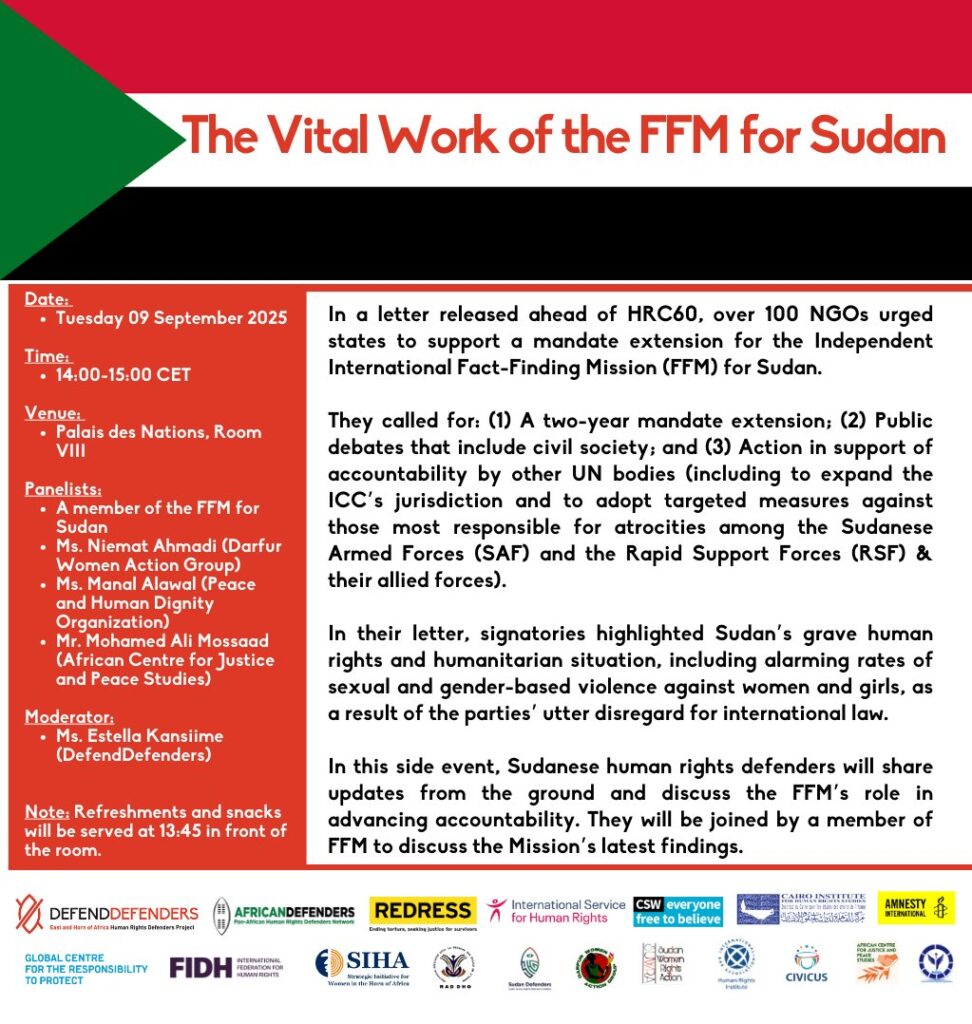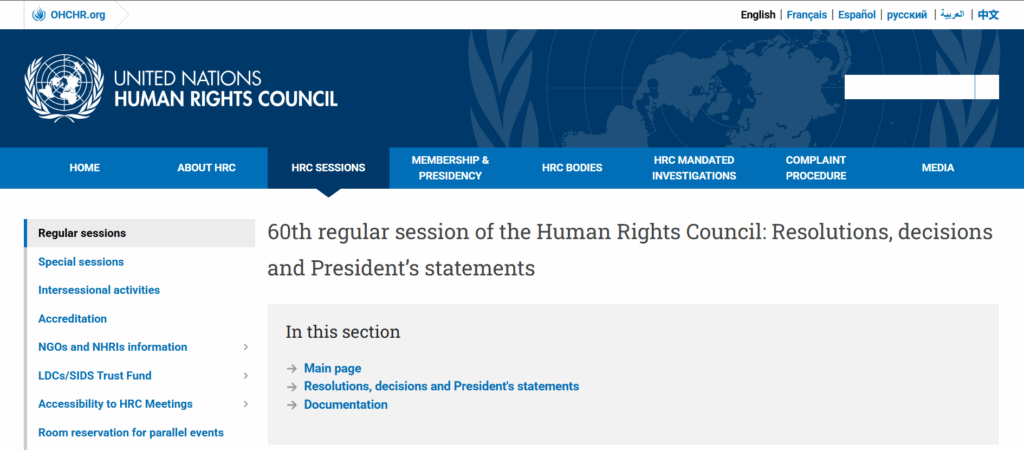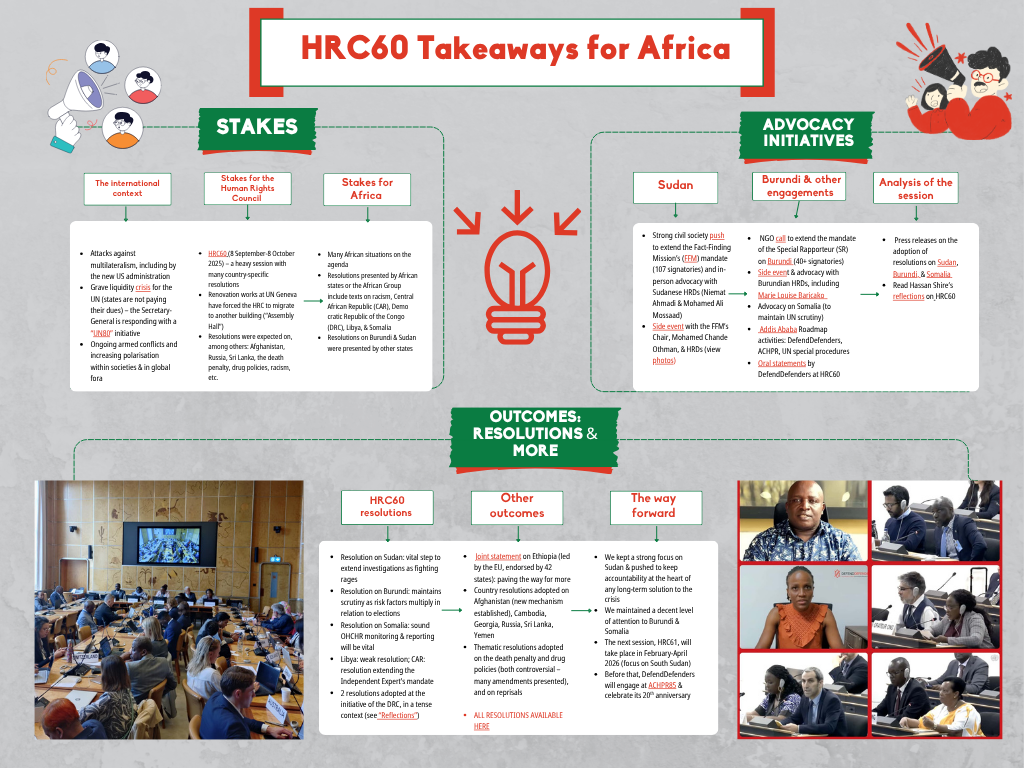The UN’s liquidity crisis and broader funding cuts to international agencies and the non-profit sector
continue to affect human rights work worldwide. It is estimated that the UN’s
budget will decrease by 15% in 2026. The UN’s human rights pillar, which was
already chronically under-funded compared to the other two pillars (development
and peace & security), with less than 5% of the organisation’s budget, risks
being disproportionately affected. The UN Secretary-General’s “UN80” initiative is
unlikely to remedy this situation (even if some states pay their outstanding
membership dues), as it outlines a plan focused on cutting funding across the
UN system, including for human rights staff, reports, and mechanisms. Behind
these figures, the jobs lost and the activities cancelled, it is rights-holders
(including victims and survivors of violations) who are affected.
In this difficult context,
the UN’s top human rights body, the Human Rights Council (HRC), continued to
prove its relevance by addressing some of the world’s worst human rights crises.
It did so by establishing or extending independent investigations (key examples
are the new Afghanistan mechanism and the FFM for Sudan (see below)) and by reiterating
the importance of accountability to find a sustainable solution to conflicts.
That said, as the HRC is
about to turn 20, in early 2026, a rationalisation and efficiency effort is
necessary. With close to 40 resolutions, the workload at HRC60 (8 September-8 October 2025) was beyond heavy. This
is unsustainable, and all actors (including states and civil society) should
reflect on priorities. The HRC excels at prevention (addressing crises at an
early stage, based on early warning and risk factors of atrocities) and
accountability (setting up investigating mechanisms), but it might be time for
it to consider merging or discontinuing some of its special procedure mandates – and getting serious at setting clear thematic
priorities.
The Office of the High
Commissioner for Human Rights (OHCHR) also has a role to play in strengthening
the HRC. Against a backdrop of attacks against multilateralism, it has a
responsibility to implement mandates set up by the HRC to address crises. This
includes the Commission of Inquiry (COI) on violations in the eastern DRC. The OHCHR’s new Human Rights Inquiries Branch
should, first and foremost, support these HRC-mandated investigations.
For DefendDefenders, HRC60
was one of its busiest sessions so far. We were active on several fronts.
Building on our work ahead of the session, led by our Geneva office, we hosted
groups of human rights defenders (HRDs) from Sudan and Burundi and conducted
activities with experts from the HRC and the African Commission on Human and
Peoples’ Rights (ACHPR), in the framework of the “Addis Ababa Roadmap.” We also advocated for meaningful outcomes on
Ethiopia and Somalia.
Sudan: as the war rages, investigations
continue
During the
summer, we fulfilled our traditional role of drafting and coordinating joint
civil letters, laying the groundwork for in-session advocacy.
Our letter on Sudan, eventually endorsed by 107 civil society
organisations, was innovative and ambitious. In addition to proposing a
two-year extension for the mandate of the Fact-Finding Mission (FFM), it highlighted ways of increasing international attention to Sudan’s
conflict and advancing the accountability agenda, including by: (i) “Enhancing”
plenary debates to provide for the participation of civil society, victims and
survivors; and (ii) Making recommendations to New York-based bodies (the UN
General Assembly and, indirectly, the UN Security Council).
We drew
additional attention to our initiative, and civil society’s asks, in an opinion piece I authored with our UN Representative and Senior
Advocate & Researcher, Nicolas Agostini.
During the
first week of HRC60 (8-12 September 2025), we hosted two HRDs, Niemat Ahmadi
(Darfur Women Action Group, DWAG) and Mohamed Ali Mossaad (African Centre for Justice
and Peace Studies, ACJPS). Together with
Amnesty International, we coordinated engagements by a larger group of Sudanese
HRDs. Throughout the week, HRDs met with a large number of states and experts.
We also held a side event, moderated by our Advocacy, Research and
Communications Manager, Estella Kansiime, which brought together HRDs and the
Chair of the FFM for Sudan, Mohamed Chande Othman (photos can be found here). During the plenary debate with the FFM, Niemat
delivered our oral statement.
The
resolution adopted on 6 October at the initiative of the core group (UK,
Germany, Ireland, Netherlands, and Norway) is strong and sends a clear message
from the international community, two and a half years after the outbreak of
fighting in Sudan. While the HRC did not heed all of civil society’s calls, it
extended the FFM’s mandate (for one year) and condemned a litany of atrocities
committed by all parties to the conflict. It also reiterated that
accountability is central to any long-term solution to Sudan’s conflict – which
we also stressed in a press release.
Mohamed Ali Mossaad’s testimony on his participation
in HRC60
HRC60 came at a time of extreme political,
security, and human rights complexity for Sudan. The renewal of the mandate of
the FFM means a great deal to the Sudanese people, especially the victims and
survivors of the current war. As a Sudanese CSO and a member organization of
DefendDefenders, ACJPS, among other CSOs,
represents the voice of the vast majority of the civilian population in
Sudan, including HRDs.
DefendDefenders provided us with a great
opportunity to facilitate our participation in HRC60 by covering all travel,
accommodation and subsistence costs in Geneva, as well as organizing and
coordinating a side event and a series of meetings with a large number of
decision-makers (diplomatic missions from various countries). We were able to
brief these delegations on all developments in Sudan, with the aim of
influencing them to support the draft resolution to renew the FFM’s mandate for
another year. This is key to ending the culture of impunity and providing
justice for victims and survivors, including HRDs.
We at ACJPS are confident that these engagements
will continue to yield positive outcomes from the HRC, which serve the
interests of the Sudanese people in terms of respecting and protecting human
rights as well as increasing access to justice for the victims and survivors.
Once again, I thank you for making our voice heard before the HRC.
Burundi: ten years on, the HRC maintains
its scrutiny
Ten years after the start of the still unresolved 2015 crisis, Burundi
has slipped down the list of the HRC’s priorities. Far from the attention it received
in 2015-2016 (including during a special session and when a COI was established), Burundi is an under-addressed – or de-prioritised –
crisis. It must not become a forgotten crisis.
In this year’s civil society’s letter, we adopted a “risk factor” approach, highlighting
risks of violations and atrocities associated with elections. We called for an
extension of the Special Rapporteur’s (SR) mandate – the only mechanism tasked
with monitoring and reporting to the international community on Burundi’s human
rights situation.
The SR is vital as the country has entered a long
electoral period that will culminate with the 2027 presidential election. The
resolution adopted on 6 October heeds our call to maintain scrutiny of the
country at this critical time. As I highlighted in a press release, “[w]ithout [the SR’s mandate], the UN would be
unable to monitor and respond to developments, including human rights abuses
and their impact on Burundi’s stability and that of the wider Great Lakes
region.”
This outcome is also the result of efforts by
Burundian HRDs. During the session, in addition to directly supporting Marie Louise Baricako (President of Mouvement INAMAHORO), during
Week 2 (15-19 September 2025), we coordinated engagements by a group of Burundian
HRDs – making sure they meet with decision-makers (state representatives). They
also took part in the plenary debate with the SR (our oral statement can be read
here) and in a side event organised by our partner FIACAT. Marie Louise was
also interviewed by Geneva Solutions – read it here.
Marie Louise Baricako’s testimony on her
participation in HRC60
On behalf of Mouvement INAMAHORO, I attended HRC60
alongside my colleagues Me Armel Niyongere (SOS-Torture/ACAT Burundi), Jean
Claude Ntiburumusi (ACAT-Burundi), Chrysostome Kirimwingabo (Ligue Iteka), and
our host Nicolas Agostini (DefendDefenders). It was an impactful mission, with
the main purpose to advocate for the renewal of the mandate of the Special
Rapporteur on Burundi.
I wish to extend all my appreciation to
DefendDefenders. I acknowledge their immeasurable support in organizing our
meetings, appointments, and all the program around this mission. Their
commitment and determination to our human rights cause impel us to remain
standing.
Our advocacy was a success. We needed to ensure
Burundi is not a “forgotten crisis.” We addressed the Council and engaged all
those we met. We emphasized that serious human rights violations are still
happening today in total impunity. The lack of rule of law and good governance
exacerbated by corruption and discrimination continue bringing down the
economic perspectives of Burundi, making the population desperate and helpless
while civic space is totally closed. We insisted on the need for accountability.
We took the opportunity to remind state delegations that the guarantors of the
Arusha peace and reconciliation Agreement (2000) should not remain indifferent
while they had committed to ensure it is
implemented for lasting peace in Burundi. It is 25 years now and peace is still
a dream!
We used all means, meeting delegations, holding a
side event (organized by FIACAT), talking to the media, and delivering an oral
statement to the Council, constantly calling for the collective responsibility
to protect the Burundian population!
We have not yet achieved, the work is to be
continued for Burundi and for Africa!
Somalia: a new approach
The Independent Expert (IE) on
Somalia is one of the longest standing special procedures. Its mandate was
established in 1993, at the time of the HRC’s predecessor, the UN Commission on
Human Rights. This mandate is now phasing out its work as the HRC is changing
its approach to addressing Somalia’s human rights situation.
In a resolution adopted by consensus, at the very end of HRC60, the
Council decided to end the IE’s mandate and replace it with technical support
and reporting by the OHCHR itself.
In a press release, we took note of the shift and highlighted that the international
community should keep a spotlight on Somalia. Any technical support should be
grounded in evidence of urgent human rights needs and, in this regard, “human
rights defenders and the National Independent Human Rights Commission have a
key role to play.”
By any standard, Somalia’s human rights situation remains among the most
serious in the world. Dropping the ball is not an option. This is why we call
on OHCHR to fully and transparently report on Somalia’s situation, with an open
mind – re-establishing a mechanism or exploring other options (such as the opening
an OHCHR country office) should remain on the table.
To successive mandate-holders, including the last one, Isha Dyfan, we
say: Thank you for your work at the service of the Somali government and
people.
Ethiopia: the HRC should define a path to a
new resolution
In addition to these three country priorities, we advocated for collective
state action on Ethiopia. After the Council’s investigating mechanism on
Ethiopia, ICHREE, was discontinued despite the release of a scathing final report, in
2023, Ethiopia’s human rights situation has fallen out of the multilateral
radar. As we stressed, this is an anomaly.
Ahead of the session, together with NGO partners, we pushed states to
define a credible path towards a new resolution on the country. These advocacy
efforts led to an encouraging first step: a joint oral statement delivered by the EU and
endorsed by a total of 42 states.
States’ and NGOs’ oral statements, meetings and briefings, as well as
side events, must be tools to raise Ethiopia’s profile and push the Council to
formulate an answer to the country’s human rights crisis, multiple armed
conflicts raging across regions, and the risk of instability for the whole Horn
of Africa region. Here again, OHCHR has a role to play. It should urgently
release a public report on violations, also showing the failure of the
transitional justice process and accountability mechanisms in the country.
Other files and engagements
At HRC60, no fewer than six African situations were on the Council’s
agenda: Burundi, Somalia and Sudan, as outlined, but also the Central African
Republic (CAR), the Democratic Republic of the Congo (DRC), and Libya.
While we did not directly engage in negotiations around resolutions on
the DRC, we followed developments. We were glad to see that the DRC
itself took the initiative of moving its resolution to the Council’s agenda
item 4 (dedicated to the most serious situations) to demand the immediate
operationalisation of the COI established during the special session of 7
February 2025. Setting up the COI is the High Commissioner’s responsibility,
and he must urgently act to allocate staff and resources to this mechanism.
In the meantime, the OHCHR Fact-Finding Mission on South and North Kivu
(OFFMK) will continue
its work – before it gives way to the COI. At the same time, we are glad that technical
assistance and capacity-building for the DRC will continue, through an item 10
resolution. We simply regret that the Team of Experts on the
DRC will cease its work.
Our work
with the UN human rights system finds its parallel at the African level, in
particular through our engagement with the ACHPR (and its Commissioners and
special mechanisms). To further advance the Addis Ababa Roadmap on
cooperation between the special procedures of the HRC and the special
mechanisms of the ACHPR, we held a side event to discuss joint work and avenues for collaboration,
as well as a private retreat with UN and African experts and OHCHR’s Special
Procedures Branch. During that retreat, we gathered input for an action plan
for the next three years. Joint actions and efforts by UN and African experts
are a way not only to advance human rights, prevention of violations,
universality and complementarity, but also to strive towards efficiency — joint
visits and missions, for instance, are cost-efficient. These are avenues to explore
in a context of financial rationalisation.
Finally, let me highlight a few other files we worked on at HRC60:
§ As Tanzania’s
presidential election approaches, we continued to draw attention to the
country’s human rights situation, including enforced disappearances and attacks
on civic space, exemplified by the unacceptable treatment meted out to Ugandan
journalist Agather Atuhaire and Kenyan activist Boniface Mwangi.
§ In our statement under item
4’s general debate, we raised concerns about Ethiopia & South Sudan,
but also grave situations across the African continent, namely Tunisia, the
Sahel (including Burkina Faso, Mali & Niger), Mozambique, and Togo.
§ During
the annual debate on reprisals against those who cooperate with the UN,
we condemned
ongoing reprisals against Kadar Abdi Ibrahim in Djibouti and mentioned other
African states that are responsible for committing these unacceptable acts. For
his part, the UN Secretary-General must continue to report on cases of ongoing
reprisals. As we highlighted, “removing these cases from the [annual] report
rewards offenders and sends the wrong message.”
§ Last,
the Defenders Coalition Kenya delivered our statement in
response to the Kenyan government’s replies to recommendations it received
during its last UPR review.
Going forward as DefendDefenders turns 20
The HRC’s 61st session (February-April 2026) will have a
focus on South Sudan – a country that needs the continued close attention of
the international community and African Union.
Before that, we will be active at the 85th ordinary session
of the ACHPR, in Banjul (October 2025), and will mark our 20th
anniversary with celebrations in Kampala, in November 2025.
Hassan Shire
Executive Director, DefendDefenders
Chairperson, AfricanDefenders
Oral statements to the Council
Advocacy documents and press releases
Side Events
Outcomes: Resolutions
- Sudan
- Burundi
- Somalia
- DRC (Item 4)
- DRC (Item 10)
- Reprisals

